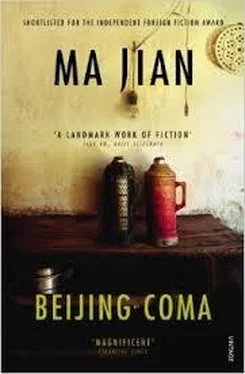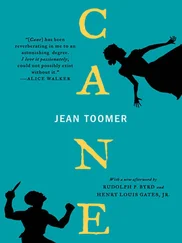During an argument we had later, she told me that she had goals and ambitions, and didn’t just want to be somebody’s wife. She said that it wasn’t enough just to tell someone you loved them, you had to give them support and encouragement every day. It’s true that, before I met her, I knew very little about love.
Professor Huang went over to the electric microscope, then came back to the corpse and said, ‘This thin, wrinkled outer layer of cerebral cortex is the most highly developed part of the brain. It’s responsible for conscious thoughts, perception, language and long-term memory. It is divided into the neocortex, palaeocortex and archicortex. This section I’ve sliced off is from the frontal lobe.’ He picked up the thin slice with a pair of tweezers and showed it to everyone. ‘This piece here might contain information about the man’s bank account, his dreams, the appearance of his mother or wife. It’s just a few milligrammes of brain tissue, but it holds a universe that, despite advances in neuroscience, still remains a mystery to us… Sun Chunlin, please step forward and describe to us the function of the neocortex.’
‘The neocortex is this region here. No — here. In evolutionary terms, this is the most recently developed part of the brain, and is associated with higher functions such as conceptualisation and planning… It’s commonly accepted that geniuses and great figures in history have highly developed brains. Think of Lenin, Tolstoy, Karl Marx — they all had big foreheads.’ The brain tissue Sun Chunlin was pressing was as soft and springy as tofu.
‘Dai Wei, come and say something about the function of the archicortex,’ said Professor Huang.
‘The archicortex is basically the hippocampus, down here…’ I said, my face beginning to redden. ‘It’s the older, primitive part of the brain and is connected with memories and emotions… If this part of the brain is damaged, the patient falls into a vegetative state.’ A-Mei, who was standing to my left, tried to encourage me with a supportive glance.
I’m not in a dissection class now. I’m a vegetable. I cannot move, touch or see. I’m a spirit trapped in a dark room, a neuron searching for a way out, a pebble plunging through the vast universe.
Melancholy yearnings stir within you. Forgotten fears and hopes drip from your bones like dark marrow.
I remember standing beside A-Mei at the sink after the dissection class. Her face was ashen. I quickly cleaned my hands with the bar of soap before passing it to her, because it had been resting in the palm of a preserved human hand left over from a previous dissection. Instead of going to the canteen, we decided to have lunch in the small restaurant outside the campus gates.
It was doing a good trade. The manager had built a second storey above the original shack, and students from several surrounding universities now regularly went there to eat. I had a bowl of chicken and dangshen-root soup. A-Mei ordered a plate of cold mung beans, but couldn’t eat much because the dissection class had ruined her appetite.
The restaurant was filled with mosquitoes. I asked the manager to turn on the electric fan. An old pop song droned from the battered cassette player on the counter. Time passed sluggishly.
A-Mei hardly said a word. I reached over and ran my hand through her hair.
‘You want another cigarette, don’t you?’ she said.
I’d already had three, so I said no.
She told me that, in Hong Kong, criminals were put in prison for up to fifty years, but were never executed. She couldn’t accept the notion that a government could order a citizen to be killed. She said that she hadn’t wanted to study medicine in China. It had been her parents’ idea.
I hadn’t realised that Hong Kong didn’t use the death penalty. ‘What about murderers and rapists?’ I asked her. ‘If the government didn’t get rid of them, they’d pose a threat to public safety.’
‘But what if the judgement is wrong? How can one ever make up for taking the life of an innocent man? And anyway, it’s not civilised to kill another human being, whether they’re guilty of the crime or not.’
She said that, while she was on hospital training in the Chinese countryside, she’d seen a doctor kill a newborn baby by injecting alcohol into its head. The mother wasn’t allowed to set eyes on it. In the afternoon, the mother slipped back into the delivery room, retrieved her dead baby from the rubbish bin and ran away with it.
‘I hear stories like that all the time,’ I said. ‘My cousin’s wife went on the run after she fell pregnant with her second child. She came up to Beijing to stay with us, but the police tracked her down and sent her back to her village. As soon as she arrived, local birth-control officers cut her belly open, pulled out the foetus and drowned it in a bucket of water… And after I said goodbye to you at the train station last time you went to Hong Kong, I saw a young couple being chased by the police. The woman was pregnant, but didn’t have a birth permit. The man managed to get away, but the woman was too slow. The police caught her and flung her onto the ground. She fell on her face. There was blood everywhere. They tied her up like a pig and carried her away.’
‘Stop it, stop it — I can’t take any more,’ A-Mei cried. ‘I want to go to Canada and study business management, or music.’
I always felt nervous when I saw A-Mei frown. I pulled a cigarette from my packet.
Noticing my worried expression, she changed the subject, and said, ‘Put that cigarette away. Do you want to go and see the exhibition in Yuexiu Park tonight? There’s going to be a bonfire party, with traditional dances performed by some ethnic minority people from Yunnan.’
Although A-Mei’s room in the newly built Overseas Chinese block was small, it had a balcony big enough to fit two chairs. Being able to sit out there made the city’s sub-tropical heat a little more bearable. She asked me to move in with her. I said I would, on condition that she let me pay the following term’s rent. She agreed, so at the beginning of the winter holiday I brought some of my stuff over from the dorm.
She’d decorated the room with bits and pieces she’d brought up with her from Hong Kong. I especially liked the pair of small foot-shaped rugs beside the bed and the fold-up plastic wardrobe. I hung up the topographical map of China on which I’d attempted to mark out the routes described in The Book of Mountains and Seas . She laid a bamboo sleeping mat over her soft foam mattress. The desk that we shared was crammed with her cassette player and piles of her books and classical music tapes.
It was the first time in my life that I had a bedside lamp of my own. I could decide whether to keep it switched on and read my books, or to turn it off and go to sleep. A-Mei’s lamp, on the other side of the bed, had a shade she’d made from an orange, flowery material. When she turned it on at night, it made the room look cosy and elegant.
She decided that the next time she went to Hong Kong, she’d bring back her violin and start practising again. She asked me whether the noise would disturb me. I told her that my mother was a professional singer, and that I’d grown up listening to her belting out arpeggios.
It was also the first time I’d shared a room with a girl. It felt very strange. Her rubber sandals were half the size of mine. I was able to go to sleep with her, wake up with her, and watch her take off and put on her knickers and bra. I could observe her rubbing moisturiser into her face and lengthening her eyelashes with a tiny black brush. I could peer inside her make-up bag and twist up her tubes of lipstick. The room had an en suite bathroom, so when she went to the toilet, I could hear all the noises she made. I was able both to see and smell her bloodstained sanitary towels. I could no longer get away with flicking my cigarette stubs onto the floor and grinding them out with my heel. If I wanted a cigarette, I had to smoke it on the balcony, then neatly deposit the stub into the tin she’d placed out there. I also had to start brushing my teeth twice a day.
Читать дальше












